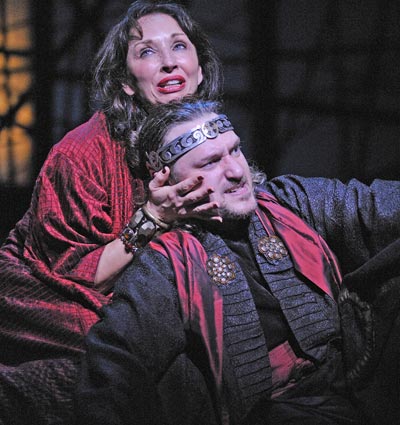As brought up by Chris Welcker in a comment to one of my previous posts, Shakespeare wasn't always respectful to women. This can be seen in the case of his wife, Anne Hathaway. Anne (although not a complete pushover, as I discussed here) was apparently not an overly critical part of Shakespeare's life. There are few remaining records of her activity in Stratford, and none at all to suggest she had anything to do with her husband's business dealings at the theater. Phyllis Rackin thinks part of this may have to with Shakespeare's lack of trust and confidence in his wife. She states: "A possibility is that William did not trust Anne to manage the family property. Her absence from the legal records of all William's financial affairs might mean that Anne had an exceptionally passive role in the economic affairs of the Shakespeare family" (39).
So although I admit that there is evidence for the idea that Shakespeare wasn't respectful to all women, there is also substantial proof that despite this, he was still influenced by the many women in his life. Whether he truly admired them or simply wrote the female characters for financial gain is something that cannot be known for sure.
Now that I've shared some opposing views to my thesis, I can approach my topic from a textual standpoint by analyzing the female characters in Shakespeare's plays. I've previously discussed Portia and Paulina, along with Miranda, as good examples of intelligent female characters. For this post, I've chosen two main characters from different plays to help prove my thesis.
Kate, from The Taming of the Shrew
 |
| A tribute of Elizabeth Taylor, who played Kate in the 1967 production |
"Widely reputed throughout Padua to be a shrew, Katherine is foul-tempered and sharp-tongued at the start of the play. She constantly insults and degrades the men around her, and she is prone to wild displays of anger, during which she may physically attack whomever enrages her. Due to her intelligence and independence, she is unwilling to play the role of the maiden daughter. She clearly abhors society’s expectations that she obey her father and show grace and courtesy toward her suitors."Clearly, Shakespeare wrote Kate with a specific idea in mind: a woman who was intelligent and independent and wasn't afraid to hold her own against men. One main branch of criticism of The Taming of the Shrew is the idea that "Kate's notorious last speech in delivered ironically and that Kate, in retaining her psychological independence from the "duped" Petruchio, remains untamed" (Bean 65). Although other viewpoints assume that Kate really has been tamed by the male society that dominated her whole life, there remains much evidence for the more feminist idea. First, The Taming of the Shrew is a social comedy, "the ironic texture of which directs our attention not primarily to Kate's psychological illness but to the social illness of a materialistic patriarchy" (Bean 65). Based on this, is it not possible that instead of advocating the patriarchal order by "taming" Kate, Shakespeare was actually making the idea into a farce? The whole play is seen through the lens of a practical joke, with the frame story of Christopher Sly, so it almost seems as though Shakespeare wanted the play to be a commentary on the faults of male domination, rather than the virtues of an obedient woman.
Lady Macbeth, from Macbeth
Another female character that exemplifies qualities far beyond what is typically assumed of a medieval woman is Lady Macbeth. Again, in case you are unfamiliar with her, here is a short description courtesy of Sparknotes:
Macbeth’s wife is a deeply ambitious woman who lusts for power and position. Early in the play she seems to be the stronger and more ruthless of the two, as she urges her husband to kill Duncan and seize the crown. After the bloodshed begins, however, Lady Macbeth falls victim to guilt and madness to an even greater degree than her husband. Her conscience affects her to such an extent that she eventually commits suicide. Interestingly, she and Macbeth are presented as being deeply in love, and many of Lady Macbeth’s speeches imply that her influence over her husband is primarily sexual. Their joint alienation from the world, occasioned by their partnership in crime, seems to strengthen the attachment that they feel to each another.Lady Macbeth is an extremely revealing character. Not only is she "strong and ruthless" (typically male characteristics), but she and her husband share a certain equality, suggested by their close relationship, his taking of her advice, and their "partnership in crime." The most interesting aspect is that although Shakespeare uses such harsh qualities as material for Lady Macbeth, he also gives her the redeeming quality of a conscience. This conscience seems suggests that women possess an inherent morality, an undeniably good characteristic. That Shakespeare allowed Lady Macbeth to retain some type of moral compass throughout all her plotting and evil schemes shows that he had some faith in the goodness of women. This seems to go against most medieval views that because of "the original created estate of woman and the curse of the Fall" that women were inherently corrupt (Klein 240).
Although these are only two examples, there are strong female characters found in almost every one of Shakespeare's plays that support the idea that he had feminist leanings. This would not only appeal to the women in his audience, but would also be a reflection of the smart and self-reliant women he personally knew.
Works Cited
Bean, John. "Comic Structuring and the Humanizing of Kate in The Taming of the Shrew." The Women's Part: Feminist Criticism of Shakespeare. Ed. Caroline Lenz. Chicago: University of Illinois Press, 1980. 65-78. Print.
Klein, Joan Larsen. "Lady Macbeth: "Infirm of Purpose." The Women's Part: Feminist Criticism of Shakespeare. Ed. Caroline Lenz. Chicago: University of Illinois Press, 1980. 240-255. Print.
